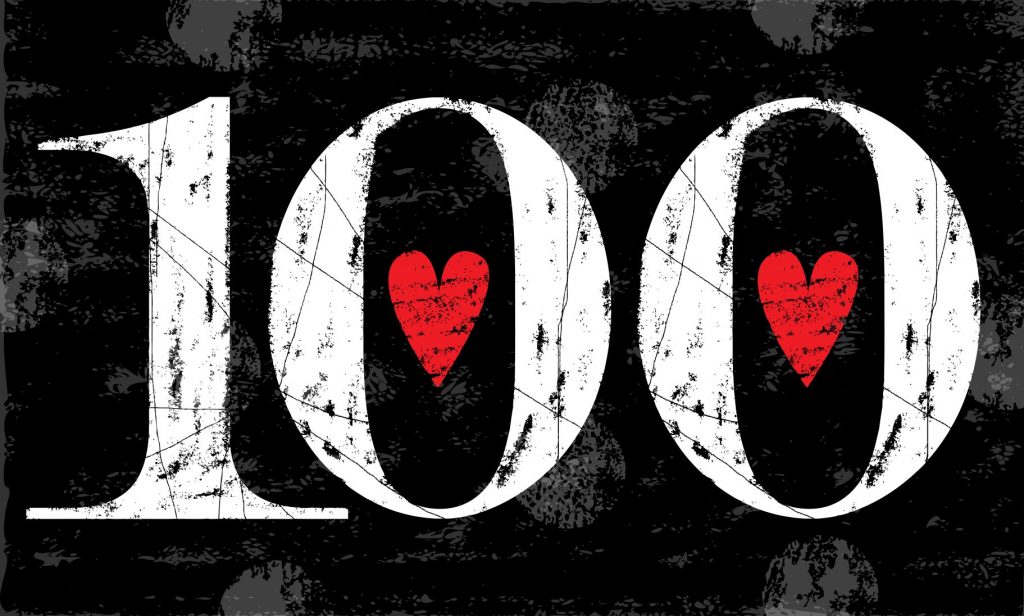
Yesterday was the release date for my 100th book. Over on my romance site, I’ve been raising hell, promoting like crazy and giving away thousands of dollars (not an exaggeration) in books and merchandise. I’ll also be celebrating in person with a few hundred other authors at the When Words Collide writers’ conference in Calgary early next month.
It’s kinda weird, really, because I just finished writing a book that will be the fourth release after this one, coming out in October. So in some ways, my attention has already moved on far beyond the 100th book.
But it is a significant milestone that not all authors get to reach. Hence the hoopla.
Here’s some of the odd things I’ve learned from writing 100 books.
There’s pride in having hit 100.
No argument. It feels fantastic to be able to say I’ve written more than 100 books. It’s an achievement, and I’ve written it into my bio.
It’s just a number.
At the same time, 100 book is nothing. It’s just a number. There’s always the next book to focus upon.
I’m not the only author to have hit this milestone
Wikipedia have a list of prolific writers. It’s not short. (And, referring back to the first point, I’m tickled pink to find out I now qualify to be on that list.)
I suspect that there a great many other writers who are still active, who would also qualify, but because they’re midlist and/or indie, they have been overlooked. They’re also probably too busy to fuss about finding a way to have themselves added to the list.
It becomes a lot easier to write more books
After 100 novels, my work processes are pretty much set. They do evolve from book to book, but I don’t have to think about what step comes next anymore. That makes each book easier and easier to write (from a time and system point of view).
It also makes snags easier to untangle, because I’ve usually dealt with something similar before, which gives me ideas about how to resolve this issue.
Each book loses its significance.
Related to it getting easier, and possibly a factor in that ease, is the feeling of “well, this is just another book”. I no longer get wound up about my book being my “baby” and all that crap. I just write the book. Sometimes, the book isn’t the one I want to write, this week. But in a couple of weeks, I’ll be writing something new, so it becomes a lot easier to suck it up and get the book done. (So does knowing that readers are anxiously waiting for it.)
It indirectly gives you confidence. Books are no longer important, or significant, or world-changing. They’re just novels.
But that also give me the freedom to write freely, with zero expectations. And sometimes I’m very (and pleasantly) surprised by the results. No self-conscious poetry or rhetoric, or awkward styles. Just a story told well.
You get to please everyone (almost)
100 books (plus 60 other shorts, flash fiction, boxed sets, story collections, and more), across several major sub-genres in the romance field, plus one “straight” science fiction series, means that I’ve pretty much got every romance reader covered. There’s something in there for them to like.
The backlist becomes a lot harder to manage
This is a big one. I noticed this issue about twenty-five books back and have been trying to figure out ways to deal with it since then. Particularly for indie authors, blowing off dust from old books and series, updating their packaging and metadata, and simply keeping them fresh becomes a major time suck that has to be managed.
Even something simple like Google’s change in price policy last week, which involves resetting the price of every book on the platform, becomes a major project when you have over 100 titles there. Ditto changing platforms, or anything that involves the whole backlist.
The backlist is the major asset
On the positive side — and this is the big one for productive indie fiction writers: A backlist of over 100 books gives you leverage denied authors with only one series or a half-dozen books. I have nearly twenty series on the go, for example. That’s 20 first-in-series books I can promote at any one time.
There are a ton of promotion possibilities, discounting, boxed series sets, collections, and omnibuses I can put together without writing a single more word. And the more words I write and books I complete, the more options I have, and the more creative I can get.
Advertising just my backlist gives me a base monthly income, every single month. New releases are the cream on the top.
I wanna hit 200 now!
If you didn’t see this coming, you’re not a fan of Isaac Asimov. Asimov was the first author I knew who wrote 200 books. I had a tattered and well-read copy of his Opus 200, which infected me with this idea of prolificacy.
At my current pace, it will take just over eight years to hit 200 books. It took 20 years to get to the first 100. So, the pace does pick up!
t.
[fusion_separator style_type=”shadow” hide_on_mobile=”small-visibility,medium-visibility,large-visibility” class=”” id=”” sep_color=”” top_margin=”” bottom_margin=”” border_size=”” icon=”” icon_circle=”” icon_circle_color=”” width=”” alignment=”center”][/fusion_separator]
.![]()
